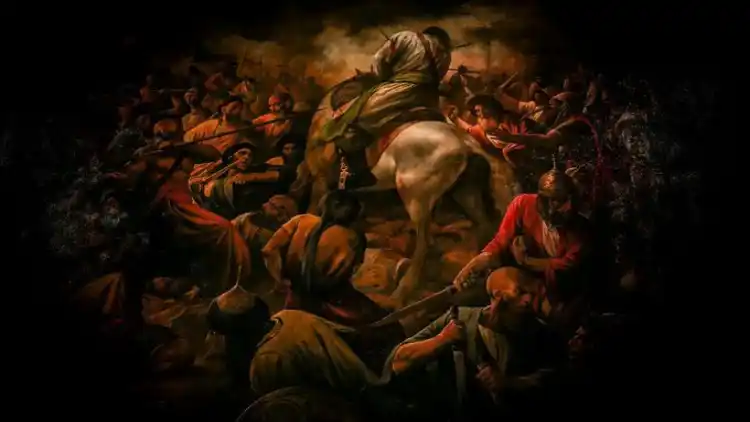
 Saquib Salim
Saquib Salim
On 10 Muharram, 61 AH (680 AD), Husain ibn Ali, grandson of Prophet Muhammad, was killed along with several of his family and followers at Karbala, Iraq by a large Yazid’s Muslim army. For centuries now, the day has been commemorated by the Muslims with public mourning. Remembering the martyrdom of Husain. The martyrdom has remained a symbol of fighting against tyranny. Karbala, in Muslim culture, is often invoked as a metaphor for standing with the truth against seemingly mighty evil.
During the freedom struggle of India, leaders appealed to their Muslim audience by invoking the metaphors of Karbala. Where the British rule was represented by Yazid and his army, while Indians were portrayed as followers of Husain, fighting for the truth. In 1921, Maulana Abul Kalam Azad addressed a gathering in Kolkata highlighting the importance of remembering martyrs of Karbala.
Maulana told a large gathering that the tragedy of Karbala in 680 AD could easily be termed as the most mourned event in human history. In his view, the importance of this day, 10 Muharram, was more than just remembering the tragedy. The address was later published in the form of a pamphlet.
From the time immemorial, according to the Maulana, humans have commemorated the events from which they can learn. Most of the festivals, across the civilizations, are meant to remember the teachings of one kind or the other. Muharram is not commemorated to remember the event of martyrdom of Husain and his comrades.
Maulana believes that Muharram is not, and cannot be a commemoration of a mighty tyrant killing a seemingly less powerful righteous man. If that would have been the case, there are hundreds of events in the history of civilizations, where tyrants have executed people standing against them, which could have been commemorated with equal zeal. But, no other event has ever been mourned and remembered like the martyrdom of Husain. What sets this event apart?
In fact, Maulana believes, this commemoration is to remember the teachings of Husain that actually are the teachings of Ali, and those in turn are nothing but the word of truth as revealed by the Quran and the Prophet (PBUH). In the form of Karbala, we remember the truth with which Husain lived, and the principles of justice he laid down. Written words, alone, cannot guide people. Living role models are needed to teach us the lessons of truth, patience and piety.
Husain is one such example. Maulana believes that Allah has sent his books with prophets because without an example to emulate people cannot understand the true meaning of His words. Without a teacher we cannot learn any book, or religion. That is why Maulana is not surprised at the claim that Ali ibn Abi Talib, son-in-law of the Prophet, was ‘Quarn Natiq’ (Speaking Quran). Ali’s life was a reflection of the Prophet and thus his actions were nothing but teachings of the Quran. Such role models are always remembered, because without them we cannot understand the word of Allah.
Maulana writes, “The teachings of this sacrifice should always be taught and the spirit of this Holy martyrdom should be remembered at least once every year.” This tragedy of Karbala contains within itself the Islamic lessons of piety, patience, truth, democracy, and justice.
Islamic traditions believe in prophethood. From the outset different prophets and messengers were appointed by Allah to guide humans on the right path. At times, these prophets waged war with tyrants. But, the family of any prophet never sacrificed themselves in the path of truth. Abrahem’s son came close to being sacrificed but was rescued. Prophet Muhammad, the last in the line of prophets, completed the message of truth with himself. So, with him the ultimate truth of fighting for the truth was also revealed.
At Karbala, the family of the Prophet, old and young, sacrificed themselves to establish the truth; the truth of religion. This is a religion that teaches justice, compassion, love, mercy, and pity. With their sacrifice, family members of the Prophet established for ages to come that in a battle between truth and falsehood life does not matter. The spirit of Islam is in this sacrifice, where a lone man defies a mighty military power. The truth, no matter how lonely, would never submit to a mighty tyrannical falsehood.
Maulana Azad quotes Zafar Ali Khan, who writes;
Karti rahegi pesh shahādat Husain ki
Azādi-e-hayāt ka ye sarmadi usool
Chadh jaaye kaT ke sar tera neze ki nok par
Lekin tu fāsiqoñ ki itā'at na kar qabool
(Martyrdom of Husain will keep on teaching
This eternal principle of free life
Even when your head is severed
Never submit to scoundrels)
(Saquib Salim is a Historian and a writer)
